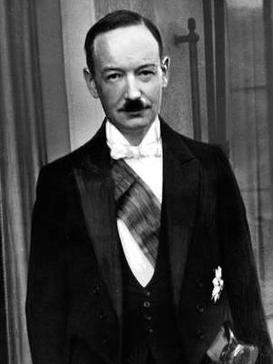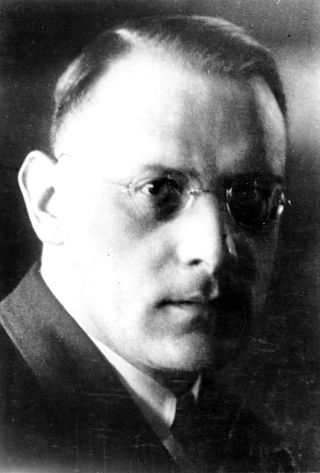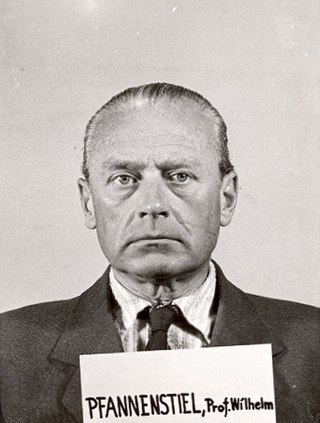Related Research Articles

Marburg is a university town in the German federal state of Hesse, capital of the Marburg-Biedenkopf district. The town area spreads along the valley of the river Lahn and has a population of approximately 76,000.

Gustav Walter Heinemann was a German politician who was President of West Germany from 1969 to 1974. He served as mayor of Essen from 1946 to 1949, West German Minister of the Interior from 1949 to 1950, and Minister of Justice from 1966 to 1969.

Werner Sombart was a German economist, historian and sociologist. Head of the "Youngest Historical School," he was one of the leading Continental European social scientists during the first quarter of the 20th century. The term late capitalism is accredited to him. The concept of creative destruction associated with capitalism is also of his coinage. His magnum opus was Der moderne Kapitalismus. It was published in three volumes from 1902 through 1927. In Kapitalismus he described four stages in the development of capitalism from its earliest iteration as it evolved out of feudalism, which he called proto-capitalism to early, high and, finally, late capitalism —Spätkapitalismus— in the post World War I period.

During World War II, some individuals and groups helped Jews and others escape the Holocaust conducted by Nazi Germany.
Franklin Ridgeway Aydelotte was a U.S. educator. He became the first non-Quaker president of Swarthmore College and between 1921 and 1940 redefined the institution. He was active in the Rhodes Scholar program, helped evacuate intellectuals persecuted by the Nazis during the 1930s and served as director of the Institute for Advanced Study during World War II.

Edgar Julius Jung was a German lawyer born in Ludwigshafen in the Kingdom of Bavaria. He was a leader of the conservative revolutionary movement in Germany that stood in opposition to not only the Weimar Republic, whose parliamentarian system he considered decadent and foreign-imposed, but also National Socialism. Jung was murdered in the 1934 Night of the Long Knives purge.

Arthur Cushman McGiffert, American theologian, was born in Sauquoit, New York, the son of a Presbyterian clergyman of Scots-Irish descent.

The history of the Jews in Germany goes back at least to the year 321 CE, and continued through the Early Middle Ages and High Middle Ages when Jewish immigrants founded the Ashkenazi Jewish community. The community survived under Charlemagne, but suffered during the Crusades. Accusations of well poisoning during the Black Death (1346–53) led to mass slaughter of German Jews, while others fled in large numbers to Poland. The Jewish communities of the cities of Mainz, Speyer and Worms became the center of Jewish life during medieval times. "This was a golden age as area bishops protected the Jews, resulting in increased trade and prosperity."

Alois Karl Hudal was an Austrian bishop of the Catholic Church and Nazi sympathizer, based in Rome. For thirty years, he was the head of the Austrian-German congregation of Santa Maria dell'Anima in Rome and, until 1937, an influential representative of the Catholic Church in Austria.

Charles Henry Bewley, GCSG was an Irish diplomat.

Hans Friedrich Karl Günther was a German writer, an advocate of scientific racism and a eugenicist in the Weimar Republic and the Third Reich. He was also known as "Rassengünther" or "Rassenpapst". He is considered to have been a major influence on Nazi racialist thought.
In the decades since the Holocaust, some national governments, international bodies and world leaders have been criticized for their failure to take appropriate action to save the millions of European Jews, Roma, and other victims of the Holocaust. Critics say that such intervention, particularly by the Allied governments, might have saved substantial numbers of people and could have been accomplished without the diversion of significant resources from the war effort.

Gerhard Kittel was a German Lutheran theologian and lexicographer of biblical languages. He was an enthusiastic supporter of the Nazis and an open antisemite. He is known in the field of biblical studies for his Theologisches Wörterbuch zum Neuen Testament.
John Dury was a Scottish Calvinist minister and an intellectual of the English Civil War period. He made efforts to re-unite the Calvinist and Lutheran wings of Protestantism, hoping to succeed when he moved to Kassel in 1661, but he did not accomplish this. He was also a preacher, pamphleteer, and writer.

Behiç Erkin was a Turkish career officer, first director (1920–1926) of the Turkish State Railways, nationalized under his auspices, statesman and diplomat of the Turkish Republic. He was Minister of Public Works, 1926–1928, and deputy for three terms; and an ambassador. He served as Turkey's ambassador to Budapest between 1928–1939, and to Paris and Vichy between August 1939-August 1943.

After Adolf Hitler came into power in 1933 and enacted policies that would culminate in the Holocaust, Jews began to escape German-occupied Europe and the United Kingdom was one of the destinations. Some came on transit visas, which meant that they stayed in Britain temporarily, while waiting to be accepted by another country. Others entered the country by having obtained employment or a guarantor, or via Kindertransport. There were about 70,000 Jewish refugees who were accepted into Britain by the start of World War II on 1 September 1939, and an additional 10,000 people who made it to Britain during the war.

Wilhelm Hermann Pfannenstiel was a German physician, member of the Nazi Party from 1933,, and SS officer from 1934,. In August 1942 he witnessed, together with Kurt Gerstein, the gassing of Jews in Bełżec extermination camp. He may also share responsibility with other SS officials in criminal medical experimentations on unwilling and uninformed human beings, mainly Jews prisoners in Dachau concentration camp.

The propaganda of the Nazi regime that governed Germany from 1933 to 1945 promoted Nazi ideology by demonizing the enemies of the Nazi Party, notably Jews and communists, but also capitalists and intellectuals. It promoted the values asserted by the Nazis, including Heldentod, Führerprinzip, Volksgemeinschaft, Blut und Boden and pride in the Germanic Herrenvolk. Propaganda was also used to maintain the cult of personality around Nazi leader Adolf Hitler, and to promote campaigns for eugenics and the annexation of German-speaking areas. After the outbreak of World War II, Nazi propaganda vilified Germany's enemies, notably the United Kingdom, the Soviet Union and the United States, and in 1943 exhorted the population to total war.
The German Social Party was a far-right political party active in the German Empire.
They Thought They Were Free: The Germans 1933-45 is a 1955 nonfiction book written by Milton Mayer, published by the University of Chicago Press. It describes the thought process of ordinary citizens during Nazi Germany.
References
- 1 2 Ingle, "Milton Mayer, Quaker Hedgehog Archived 2013-06-30 at the Wayback Machine ."
- ↑ Julius Schwartz, Solomon Aaron Kaye, and John Simons, Who's Who in American Jewry Vol. 3 (Jewish Biographical Bureau, 1939).
- ↑ Martin, Douglas (December 20, 2014). "Rock Scully, Grateful Dead's Manager Who Put the Band on Records, Dies at 73". New York Times .
- ↑ Kohn, Hans (May 8, 1955). "'Best Time of Their Lives' THEY THOUGHT THEY WERE FREE: THE GERMANS 1933-45. By Milton Mayer. 346 pp. Chicago: University of Chicago Press". New York Times . Retrieved 2020-05-10.
- ↑ "Writers and Editors War Tax Protest" January 30, 1968 New York Post
- ↑ "WRITER DEMANDS PASSPORT ACTION; Milton Mayer Wants One or to Be Charged With Felony Unable to Fill Assignments". New York Times. September 22, 1963. Retrieved 2020-05-10.
- ↑ They Thought They Were Free: The Germans 1933-45 (University of Chicago Press: Chicago, 2017), p. 347 - 378.